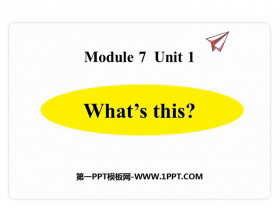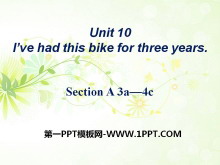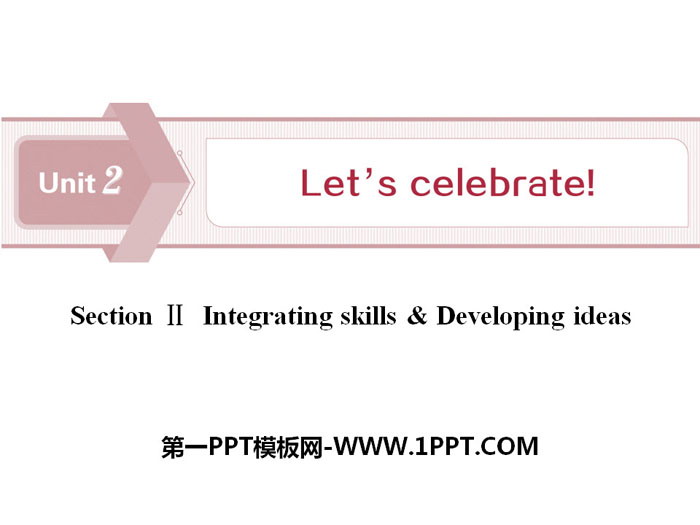
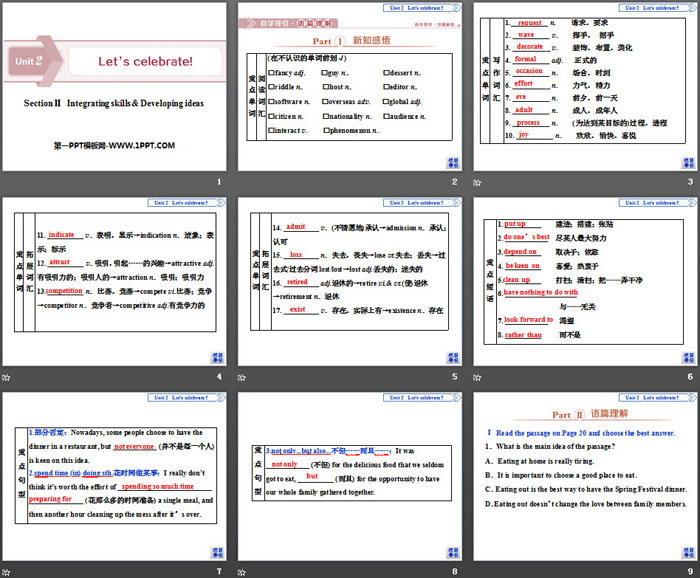
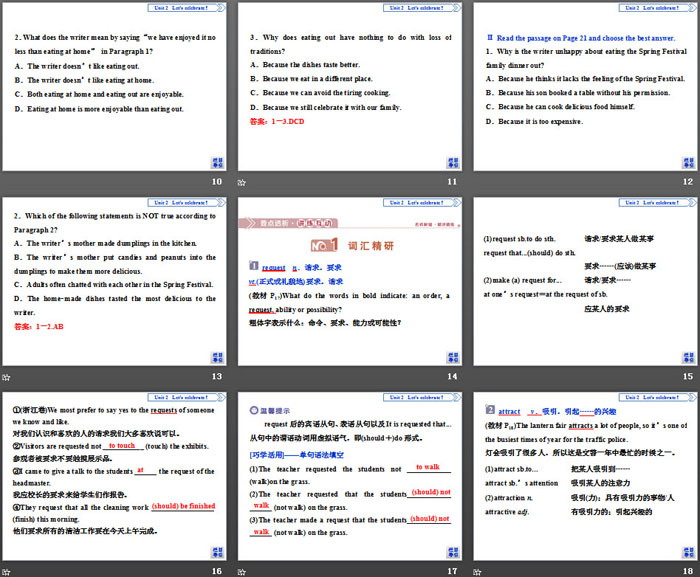
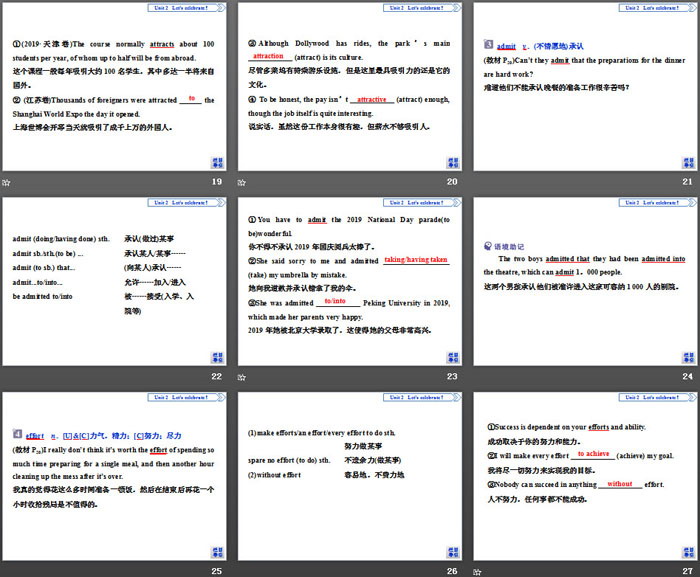

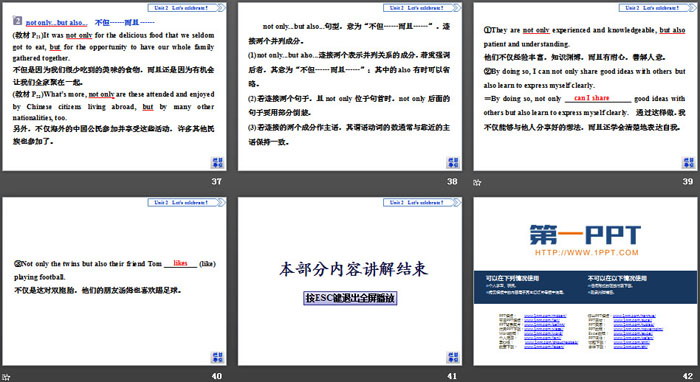
《Let's celebrate!》SectionⅡPPT
第一部分内容:新知感悟
重点单词
阅读词汇
(在不认识的单词前划√)
□fancy adj. □guy n. □dessert n.
□riddle n. □host n. □editor n.
□software n. □overseas adv. □global adj.
□citizen n. □nationality n. □audience n.
□interact v. □phenomenon n.
写作词汇
1.__________ n. 请求,要求
2. __________ v. 挥手, 招手
3. __________ v. 装饰,布置,美化
4. __________ adj. 正式的
5. __________ n. 场合,时刻
6. __________ n. 力气,精力
7. __________ n. 前夕,前一天
8. __________ n. 成人,成年人
9. __________ n. (为达到某目标的)过程,进程
10. __________ n. 欢欣,愉快,喜悦
重点短语
1. __________ 建造;搭建;张贴
2. ____________ 尽某人最大努力
3. __________ 取决于;依靠
4. __________ 喜爱;热衷于
5. __________ 打扫;清扫;把……弄干净
6. ____________________ 与……无关
7. ____________ 渴望
8. __________ 而不是
重点句型
1.部分否定:Nowadays, some people choose to have the dinner in a restaurant, but ____________ (并不是每一个人) is keen on this idea.
2.spend time (in) doing sth.花时间做某事:I really don’t think it’s worth the effort of __________________________
_______________ (花那么多的时间准备) a single meal, and then another hour cleaning up the mess after it’s over.
3.not only...but also...不但……而且……:It was ____________ (不但) for the delicious food that we seldom got to eat, __________ (而且) for the opportunity to have our whole family gathered together.
... ... ...
Let's celebrate! PPT,第二部分内容:语篇理解
Ⅰ Read the passage on Page 20 and choose the best answer.
1.What is the main idea of the passage?
A.Eating at home is really tiring.
B.It is important to choose a good place to eat.
C.Eating out is the best way to have the Spring Festival dinner.
D.Eating out doesn’t change the love between family members.
2.What does the writer mean by saying “we have enjoyed it no less than eating at home” in Paragraph 1?
A.The writer doesn’t like eating out.
B.The writer doesn’t like eating at home.
C.Both eating at home and eating out are enjoyable.
D.Eating at home is more enjoyable than eating out.
3.Why does eating out have nothing to do with loss of traditions?
A.Because the dishes taste better.
B.Because we eat in a different place.
C.Because we can avoid the tiring cooking.
D.Because we still celebrate it with our family.
Ⅱ Read the passage on Page 21 and choose the best answer.
1.Why is the writer unhappy about eating the Spring Festival family dinner out?
A.Because he thinks it lacks the feeling of the Spring Festival.
B.Because his son booked a table without his permission.
C.Because he can cook delicious food himself.
D.Because it is too expensive.
2.Which of the following statements is NOT true according to Paragraph 2?
A.The writer’s mother made dumplings in the kitchen.
B.The writer’s mother put candies and peanuts into the dumplings to make them more delicious.
C.Adults often chatted with each other in the Spring Festival.
D.The homemade dishes tasted the most delicious to the writer.
... ... ...
Let's celebrate! PPT,第三部分内容:词汇精析
1.request n.请求,要求
vt.(正式或礼貌地)要求,请求
(教材P17)What do the words in bold indicate: an order, a request, ability or possibility?
粗体字表示什么:命令、要求、能力或可能性?
(1)request sb.to do sth.请求/要求某人做某事
request that...(should) do sth.要求……(应该)做某事
(2)make (a) request for... 请求/要求……
at one’s request=at the request of sb.应某人的要求
①(浙江卷)We most prefer to say yes to the requests of someone we know and like.
对我们认识和喜欢的人的请求我们大多喜欢说可以。
②Visitors are requested not ___________ (touch) the exhibits.
参观者被要求不要触摸展示品。
③I came to give a talk to the students ______ the request of the headmaster.
我应校长的要求来给学生们作报告。
④They request that all the cleaning work _________________ (finish) this morning.
他们要求所有的清洁工作要在今天上午完成。
2. attract v.吸引,引起……的兴趣
(教材P18)The lantern fair attracts a lot of people, so it’s one of the busiest times of year for the traffic police.
灯会吸引了很多人,所以这是交警一年中最忙的时候之一。
(1)attract sb.to... 把某人吸引到……
attract sb.’s attention 吸引某人的注意力
(2)attraction n. 吸引(力);具有吸引力的事物/人
attractive adj. 有吸引力的;引起兴趣的
①(2019•天津卷)The course normally attracts about 100 students per year, of whom up to half will be from abroad.
这个课程一般每年吸引大约100名学生,其中多达一半将来自国外。
② (江苏卷)Thousands of foreigners were attracted ______ the Shanghai World Expo the day it opened.
上海世博会开幕当天就吸引了成千上万的外国人。
... ... ...
Let's celebrate! PPT,第四部分内容:句型精析
1.部分否定
(教材P20)Nowadays, some people choose to have the dinner in a restaurant, but not everyone is keen on this idea.
现在,有些人选择在餐馆吃饭,但并不是每一个人都喜欢这个主意。
本句中的not everyone=everyone...not为部分否定, 表示 “并非每一个人……都……” 。部分否定通常有以下几种情况:
(1)否定词与 all, both, every, everyone, everything等连用(不管否定词放在什么位置);
(2)否定词和always, often等连用。
①—What do you think of the songs?
——你认为这些歌曲怎么样?
—As a matter of fact, not every one of them sounds beautiful.
——事实上,并不是每一首歌曲都好听。
②All these books are not popular with people.
=_________ these books are popular with people.
这些书并非全都受人们的欢迎。
③Both of the two maths problems are not very difficult.
=_________ of the two maths problems are very difficult.
这两道数学题并非都很难。
2. not only...but also... 不但……而且……
(教材P21)It was not only for the delicious food that we seldom got to eat, but for the opportunity to have our whole family gathered together.
不但是因为我们很少吃到的美味的食物,而且还是因为有机会让我们全家聚在一起。
(教材P23)What’s more, not only are these attended and enjoyed by Chinese citizens living abroad, but by many other nationalities, too.
另外,不仅海外的中国公民参加并享受这些活动,许多其他民族也参加了。
not only...but also...句型,意为“不但……而且……”,连接两个并列成分。
(1)not only...but also...连接两个表示并列关系的成分,着重强调后者,其意为“不但……而且……”;其中的also有时可以省略。
(2)若连接两个句子,且not only位于句首时,not only后面的句子要用部分倒装。
(3)若连接的两个成分作主语,其谓语动词的数通常与靠近的主语保持一致。
... ... ...
关键词:外研版高中英语必修二PPT课件免费下载,Let's celebrate! PPT下载,.PPT格式;







